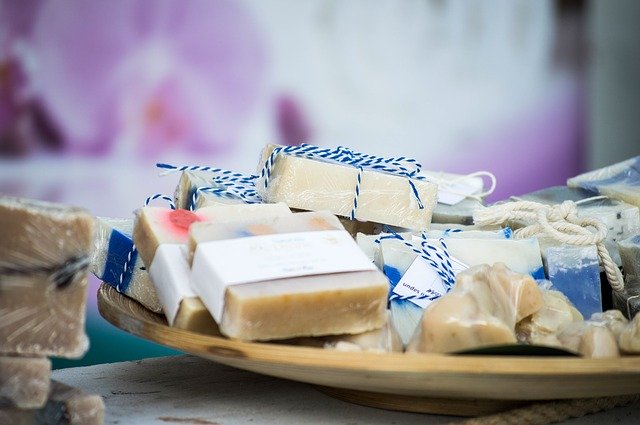Lifestyle
Commercial Bar Soap Vs. Handmade Organic Soap

Soap is one of the essentials to maintain one’s health and hygiene. With about 10 million global supply of soap, you can make out that the demand for soap all over the world is tremendous. An essential part of our healthcare routine, soap is therefore produced in various ways in 2020.
Germs and microbes are ever-present in the environment. No matter where you go, what you do, they are literally everywhere. Water, air, hands, tables, you cannot escape them. While some of these microbes are healthy for human health, most of them are also harmful and adversely affect the health of human beings. That is where soap comes into play. It keeps these harmful germs out of our bodies. It acts as the first line of defense against harmful germs and bacterias.
What is Soap?
In simple terms, soap is a mixture of fat, water, and an alkali or basic salt. They are water-soluble components that are produced by saponification. The reaction occurs between caustic soda or caustic potash and any fatty acid produced from animals or vegetables.
History has it that the Babylonians are credited for producing the first recipe of soap. The ancient Egyptians, too, came up with similar recipes, usually for treating sores, skin diseases, and personal washing.
For centuries now, the basic combination of producing soap has not changed. It is the same basic salt, water, and fat. However, the proportional quality and processes have changed over the years. Today, there are two methods to make soap- cold process and hot process.
In the cold process, the lye solution is mixed with animal or vegetable fat at room temperature. As the reaction takes place, the solution heats up and thickens. Before it thickens completely, it is poured into a mold to give it a solid shape.
The hot process is what has been used traditionally. This ancient procedure requires an external source of heat to produce soap. Here, the ingredients are heated to speed up the saponification process. The soap is purely liquid when poured in a mold and solidifies slowly. Once the solidification is over, the soap is ready to use.
The Mechanics of Soap
Soap is used to remove dirt, germs, and dead cells from our hands and body. Every day new cells are generated in our body to replace millions of dead cells. These dead cells, however, sometimes stick to the outer layer of the skin. Soap assists in removing these dead cells from our bodies.
Soap molecules are a type of surfactant that easily mixes with both oil and water. This quality of soap mediates between oil and water. The oil from the body sticks to the suds and is then rinsed off by the water.
Commercial Soap
Although commercial soap uses the same ingredients for making soap, it also contains synthetic and chemical products that cause skin irritation. Such as surfactants are often linked with toxicity, endocrine disruption, and often cancer.
Most of the commercially manufactured soaps also contain parabens. It produces too much estrogen in the body. It often causes breast cancer and damages the reproductive tissue in the body.
Artificial fragrance present in these soaps often causes skin irritation and removes all the natural oil from the skin. They are one of the reasons why the skin loses its soft texture and turns flaky. They are derived from petroleum and are also not very good for the environment.
Organic Handmade Soap
Natural organic soap is made out of fat or oil, lye water, and all-natural substances such as natural dyes and essential oils. The added benefit of handmade and organic soap is that the ingredients are all produced through organic farming i.e., the farming does not use any pesticide or fertilizers for production.
Organic Soap– Why is it Better?
Organic is always better and healthy for the skin and body. Although our body adapts to the chemicals that are present in commercially manufactured soap, it acts as a slow poison for the skin that slowly damages the outer layer of skin, leaving it completely dry and irritated.
Whereas, the organic ingredients present in handmade organic soap is gentle on the skin. It soothes the burn and irritation of dry skin and balances the natural pH level.
Base Oils
In most of the soap production, base oils become an essential ingredient. Base oils are mostly the cooking oils that can be eaten and hence also prove better for the external health of the skin. Base oils such as coconut oil, olive oil, palm oil, and other edible oils keep the skin hydrated and glowing.
Although base oils are also used in commercial products, the chemical alkali and surfactant have an overpowering presence in these soaps.
Essential oil
It is usually warned that one should not directly use essential oils directly on the body because of its volatile nature. A strong concentration may cause irritation. However, the fragrant compound is most plants have a significant effect on soaps. Hence, the essential oils are diluted when mixed with base oils. It makes the essential oil a safe product to add fragrance to organic soap.
Glycerin
Glycerin is a necessity for organic soaps. It is a natural ingredient of soap production. The commercial companies usually take the glycerin out to make the soap last longer. However, glycerin is a substance that attracts moisture from the air to the skin. Two such substances are honey and aloe vera, which are naturally beneficial for the skin.
The Bottom Line
While commercial soaps are often inexpensive, they cause severe damage to the environment. The detergent and suds are non-biodegradable and cause water and soil pollution. The process itself uses several synthetic products that are extracted by causing severe damage to the environment.
Organic soaps are safe both for the body and the environment. The natural means of production makes it healthier and better for the body. If you’re looking for more organic handmade soaps, check out Les Creme.
Lifestyle
Kat Marie Alvarez: Where Innovation Meets Regulation

Regulation is often thought of as a limitation, yet in healthcare, it also serves as a foundation for building models that endure. For Kat Marie Alvarez, Founder and CEO of KATALYST & CO, the framework of rules established by agencies like CMS (Centers for Medicare and Medicaid) and the OIG ( office of the Inspector General) create opportunities to design systems that are compliant, ethical, and transformative. Her approach demonstrates that regulation can be a platform for innovation when it is interpreted with both technical rigor and vision.
Kat’s 25-year career reflects this philosophy. A former nurse who advanced into executive leadership and strategy, she has led $2.7B+ P&L operations, advised on over $5B in healthcare transactions, and guided value based organizations including Innovacare, Cano Health, WellMed, Centene, and Humana through periods of exponential scaling. Her perspective combines clinical, financial, and regulatory experience, giving her a unique ability to design structures that support integrity and accountability while driving measurable outcomes.
Turning Statutes into Strategy
For Kat, regulation serves as a framework for building smarter and more ethical models. She interprets CMS guidance and OIG rules as levers for innovation, using them to advance integrity and accountability. With the CMS V28 risk adjustment model, Alvarez refined coding practices, strengthened clinical documentation, and structured risk frameworks that reward accuracy and elevate standards of care. In addressing RADV audits, she crafted strategies that protect stakeholders while keeping patient outcomes at the forefront. She aligns compliance, cost, and care in equal measure. Her current work as a contributor to the CMS IDea Challenge, an initiative focused on strengthening the foundation of trust in our system, further echoes her commitment to advancing regulations in ways that unlock innovation while safeguarding the integrity of care.
Her interpretive approach brings discipline and vision to every challenge. She engages stakeholders to redesign workflows that meet regulatory requirements and enhance the patient experience. Each policy becomes a mechanism to strengthen accountability and operational precision, shaping a system that is both compliant and humane.
Innovation Built Within Boundaries
At KATALYST & CO, this interpretive approach is carried into every project. Kat has integrated predictive analytics and AI-driven tools into care models, with safeguards that ensure interventions remain clinician-led and ethically sound. For example, AI flags in chronic disease management are connected to human-led actions that improve patient care. The result is a model that benefits from technology while preserving accountability and clinical integrity.
Staffing and infrastructure provide another example of her philosophy in action. By leveraging offshore BPO operations in Latin America, Asia, and Eastern Europe, KATALYST & CO extends capacity for health plans and providers. These expansions are carefully designed to meet data security, licensure, and jurisdictional requirements, ensuring that global reach is paired with local compliance. It is a system that balances scale with responsibility.
The Art of Influence Through Alignment
Kat often describes her role as translating complexity into clarity. Whether she is working with payers, providers, or investors, she builds consensus by grounding ambitious strategies in the language of statute. Value-based care models, utilization management programs, and clinical frameworks are designed to prove compliant ROI for stakeholders while maintaining patient focus.
Her approach begins with people. In integrations, partnerships, and platform builds, she respects legacy strengths, listens to frontline voices, and creates systems that are not only efficient but also trusted. This ensures that compliance does not feel like restriction, but like a structure that supports innovation and adoption.
Redefining the Future of Compliance and Care
KATALYST & CO is scaling with $10M in initial funding, expanded international operations, and a growing advisory portfolio. Under Kat’s leadership, the firm is showing how regulation can be a foundation for both innovation and durability. She demonstrates that lasting progress in healthcare is achieved by leaders who know how to design systems that are bold, ethical, and deeply human.
By approaching regulation as a guide rather than a limitation, Kat Alvarez is building models that prove compliance and innovation can move forward together. Her formula ensures that the future of healthcare is shaped not only by ambition, but also by trust and responsibility.
-

 Tech5 years ago
Tech5 years agoEffuel Reviews (2021) – Effuel ECO OBD2 Saves Fuel, and Reduce Gas Cost? Effuel Customer Reviews
-

 Tech6 years ago
Tech6 years agoBosch Power Tools India Launches ‘Cordless Matlab Bosch’ Campaign to Demonstrate the Power of Cordless
-

 Lifestyle7 years ago
Lifestyle7 years agoCatholic Cases App brings Church’s Moral Teachings to Androids and iPhones
-

 Lifestyle5 years ago
Lifestyle5 years agoEast Side Hype x Billionaire Boys Club. Hottest New Streetwear Releases in Utah.
-

 Tech7 years ago
Tech7 years agoCloud Buyers & Investors to Profit in the Future
-

 Lifestyle5 years ago
Lifestyle5 years agoThe Midas of Cosmetic Dermatology: Dr. Simon Ourian
-

 Health7 years ago
Health7 years agoCBDistillery Review: Is it a scam?
-

 Entertainment7 years ago
Entertainment7 years agoAvengers Endgame now Available on 123Movies for Download & Streaming for Free
